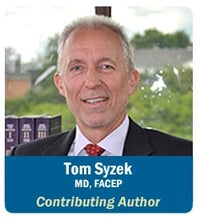 Ever since the Institute of Medicine’s report To Err is Human was released in 2000, healthcare has seen a surge in patient safety initiatives. Analysis of medical errors has become increasingly widespread, with several different methods being used by hospitals and practitioners. Of these methods, I suggest that cognitive error analysis may prove to be one of the most valuable in determining the real underlying reasons for medical errors that lead to unexpected adverse patient outcomes.
Ever since the Institute of Medicine’s report To Err is Human was released in 2000, healthcare has seen a surge in patient safety initiatives. Analysis of medical errors has become increasingly widespread, with several different methods being used by hospitals and practitioners. Of these methods, I suggest that cognitive error analysis may prove to be one of the most valuable in determining the real underlying reasons for medical errors that lead to unexpected adverse patient outcomes.
The true origin of an adverse patient outcome may never be discovered for the simple reason that one key question was neither asked nor answered – “What was the practitioner really thinking?” Very often the answer is there, hidden in the decision-making area of the brain where the error truly began. Although it is not always possible to know the thought process behind every medical error, it is worth posing this question along with the other standard inquiries.
Issues such as how clinical decisions are made, how they can lead to medical errors, and what can be done to prevent faulty decision-making have gained much attention in the medical literature of the past 15 years. The term cognitive autopsy appeared in the literature about a decade ago; it refers to the process of analyzing medical outcomes from the cognitive viewpoint. The practice of cognitive error analysis is another valuable weapon in the armamentarium of a patient safety program.
Some of the popular methods of medical error analysis include:
- Morbidity and mortality conference
- Medical-legal analysis
- Root cause analysis
- Cognitive error analysis
What is a Cognitive Autopsy?
 The cognitive autopsy is a valuable tool, a newer method of error analysis defined as a “cognitive root cause analysis of a medical event.” Its purpose is to answer the key question, “Where did thinking and decision-making go wrong?” The cognitive autopsy is also designed to provide meaningful, realistic self-feedback so that four things will happen:
The cognitive autopsy is a valuable tool, a newer method of error analysis defined as a “cognitive root cause analysis of a medical event.” Its purpose is to answer the key question, “Where did thinking and decision-making go wrong?” The cognitive autopsy is also designed to provide meaningful, realistic self-feedback so that four things will happen:
- Insight will develop.
- Learning will occur.
- Clinical cognition will change.
- The adverse event will be less likely to happen again.
How is a Cognitive Autopsy Performed?
The process of a cognitive autopsy was outlined by Dr. William Croskerry more than 10 years ago. As soon as possible after you are aware that your patient has an unexpected adverse outcome, apply your knowledge of the CDRs (cognitive dispositions to respond) and ADRs (affective dispositions to respond) to analyze the event using the following guidelines:
- Do not discuss with others initially.
- Complete as soon as possible after the event.
- Complete when you are well rested.
- Find a quiet place.
- Go through the whole shift.
- Free-associate fully about the event. Recall thoughts and feelings.
- Play close attention to ambient conditions.
- Write down everything (however trivial).
- Use QA and Peer Review processes to discuss with others.
- Use a list to review the CDRs and ADRs.
- Identify which CDRs and ADRs were involved and their impact.
This new tool of cognitive error analysis can be incorporated into an existing process such as a Morbidity and Mortality Conference, a Quality Assurance review, and Peer Review. You can participate in cognitive autopsies on cases involving other practitioners as long as there is enough detail and information available. Be sure to follow existing policies pertaining to confidentiality.
The following is a list of some of the more than 40 CDRs and ADRs that have been described; become familiar with and use this list as you perform cognitive autopsies.
- Anchoring
- Availability
- Commission bias
- Confirmation bias
- Diagnostic momentum
- Gambler’s fallacy
- Gender bias
- Hindsight bias
- Omission bias
- Outcome bias
- Overconfidence bias
- Playing the odds
- Posterior probability
- Premature closure
- Representativeness
- Search satisficing
- Zebra retreat
A cognitive autopsy, despite the terminology, is not limited to cases where the outcome is fatal. Any case of unexpected adverse outcome with possible medical error is fair game for a cognitive autopsy.
In conclusion, a few quotes from baseball legend Yogi Berra that are germane to cognitive errors:
- We made too many wrong mistakes.
- Baseball is ninety percent mental and the other half is physical.
- If you ask me anything I don’t know, I’m not going to answer.
References
- Croskerry P. Achilles heels of the ED: Delayed or Missed Diagnoses. ED Legal Letter. 2003;14:109-20.
- Croskerry P. Diagnostic Failure: A Cognitive and Affective Approach. In: Henriksen K, Battles JB, Marks ES, et al., editors. Advances in Patient Safety: From Research to Implementation (Volume 2: Concepts and Methodology). Rockville (MD): Agency for Healthcare Research and Quality (US); 2005 Feb.
- Croskerry P. The importance of cognitive errors in diagnosis and strategies to prevent them. Acad Med. 2003;78:1-6.


